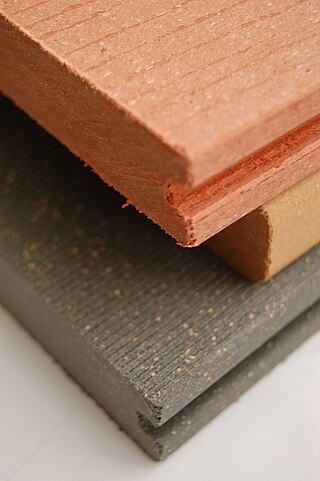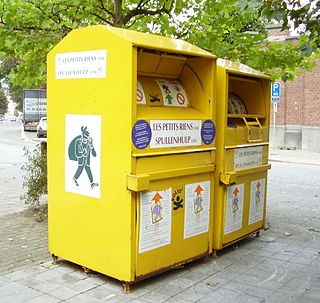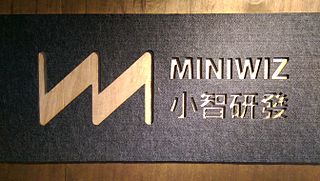
UPM-Kymmene Oyj is a Finnish forest industry company. UPM-Kymmene was formed by the merger of Kymmene Corporation with Repola Oy and its subsidiary United Paper Mills Ltd in 1996. UPM consists of six business areas: UPM Fibres, UPM Energy, UPM Raflatac, UPM Specialty Papers, UPM Communication Papers and UPM Plywood. The Group employs around 17,000 people and it has production plants in 11 countries. UPM shares are listed on the NASDAQ OMX Helsinki stock exchange. UPM is the only paper company which is listed in the global Dow Jones Sustainability Index and also a member of the United Nations Global Compact organization.
Eastman Chemical Company is an American company primarily involved in the chemical industry. Once a subsidiary of Kodak, today it is an independent global specialty materials company that produces a broad range of advanced materials, chemicals and fibers for everyday purposes. Founded in 1920 and based in Kingsport, Tennessee, the company operates 36 manufacturing sites worldwide and employs approximately 14,000 people.

In architecture, a deck is a flat surface capable of supporting weight, similar to a floor, but typically constructed outdoors, often elevated from the ground, and usually connected to a building. The term is a generalization from the deck of a ship. A level architectural deck may be intended for use by people, e.g., what in the UK is usually called a decked patio. "Roof deck" refers to the flat layer of construction materials to which the weather impervious layers are attached to a form a roof. It is known as the "roof deck", and they may be either level or sloped.

Wood–plastic composites (WPCs) are composite materials made of wood fiber/wood flour and thermoplastic(s) such as polythene (PE), polypropylene (PP), polyvinyl chloride (PVC), or polylactic acid (PLA).

Staedtler Mars GmbH & Co. KG is a German multinational stationery manufacturing company based in Nuremberg. The firm was founded by J.S. Staedtler (1800–1872) in 1835 and produces a large variety of stationery products, such as writing implements, art materials, and office supplies.

A disposable is a product designed for a single use after which it is recycled or is disposed as solid waste. The term is also sometimes used for products that may last several months to distinguish from similar products that last indefinitely. The word "disposables" is not to be confused with the word "consumables", which is widely used in the mechanical world. For example, welders consider welding rods, tips, nozzles, gas, etc. to be "consumables", as they last only a certain amount of time before needing to be replaced. Consumables are needed for a process to take place, such as inks for printing and welding rods for welding, while disposable products are items that can be discarded after they become damaged or are no longer useful.

Glass recycling is the processing of waste glass into usable products. Glass that is crushed or imploded and ready to be remelted is called cullet. There are two types of cullet: internal and external. Internal cullet is composed of defective products detected and rejected by a quality control process during the industrial process of glass manufacturing, transition phases of product changes and production offcuts. External cullet is waste glass that has been collected or reprocessed with the purpose of recycling. External cullet is classified as waste. The word "cullet", when used in the context of end-of-waste, will always refer to external cullet.

Biodegradable plastics are plastics that can be decomposed by the action of living organisms, usually microbes, into water, carbon dioxide, and biomass. Biodegradable plastics are commonly produced with renewable raw materials, micro-organisms, petrochemicals, or combinations of all three.

Textile recycling is the process of recovering fiber, yarn, or fabric and reprocessing the material into new, useful products. Textile waste is split into pre-consumer and post-consumer waste and is sorted into five different categories derived from a pyramid model. Textiles can be either reused or mechanically/chemically recycled.

Upcycling, also known as creative reuse, is the process of transforming by-products, waste materials, useless, or unwanted products into new materials or products perceived to be of greater quality, such as artistic value or environmental value.
Composite construction is a generic term to describe any building construction involving multiple dissimilar materials. Composite construction is often used in building aircraft, watercraft, and building construction. There are several reasons to use composite materials including increased strength, aesthetics, and environmental sustainability.

Reclaimed lumber is processed wood retrieved from its original application for purposes of subsequent use. Most reclaimed lumber comes from timbers and decking rescued from old barns, factories and warehouses, although some companies use wood from less traditional structures such as boxcars, coal mines and wine barrels. Reclaimed or antique lumber is used primarily for decoration and home building, for example for siding, architectural details, cabinetry, furniture and flooring.
Recycling can be carried out on various raw materials. Recycling is an important part of creating more sustainable economies, reducing the cost and environmental impact of raw materials. Not all materials are easily recycled, and processing recyclable into the correct waste stream requires considerable energy. Some particular manufactured goods are not easily separated, unless specially process therefore have unique product-based recycling processes.

Miniwiz is a Taiwanese company that upcycles consumer and industrial waste into construction and consumer products. The company was founded by Arthur Huang. It is headquartered in Taiwan with offices in Milan, Singapore, Beijing, and Shanghai.
Composite lumber is a material that is a mixture of wood fiber, plastic, and some type of binding agent. These ingredients are put together to form a material that is denser, stronger, and heavier than wood alone, a wood-plastic composite.

Brianne West is a New Zealand environmentalist, entrepreneur and the founder of Ethique, the world's first zero-waste beauty brand. In 2016 she was named a "Global Thinker" by Foreign Policy magazine and in 2019 the EY Young Entrepreneur of the Year.
Plastic-coated paper is a coated or laminated composite material made of paper or paperboard with a plastic layer or treatment on a surface. This type of coated paper is most used in the food and drink packaging industry.

GreenMantra Technologies is a clean technology company that produces value-added synthetic waxes and specialty polymers from post-consumer and post-industrial recycled plastics. These products are used in various applications including roofing and paving, plastics processing, and plastics composites. The company is focused on "up-cycling" recycled plastics into specialty materials, creating a more circular economy for plastics where they are beneficially reused rather than landfilled.

Closed-loop recycling is the process by which a product or material can be used and then turned into a new product indefinitely without losing its properties during the recycling process.

UBQ Materials is an Israeli cleantech company created to convert unsorted household waste into a thermoplastic composite. The company's primary product, UBQ, is a thermoplastic, sold in the form of pellets, that can be used to substitute for wood, concrete, or oil-based plastics in the manufacturing of durable products. In 2018, UBQ Materials Ltd. became a Certified B Corporation.
















